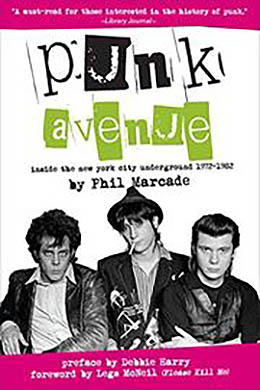 Phillippe Marcade was briefly drummer and then frontman for long-running New York City band The Senders, and a close confidant of many on the CBGB and Max’s Kansas City scenes.
Phillippe Marcade was briefly drummer and then frontman for long-running New York City band The Senders, and a close confidant of many on the CBGB and Max’s Kansas City scenes.
Born in France, for the most illegally living in NYC, he rode the rock and roll roller coaster as hard as anyone in Lower Manhattan.
“Punk Avenue” - the title is a play-on-words reference to the Park Avenue location of Max’s - is a fantastic read. There are no dead spots; Marcade tells his story colourfully, underlined by droll, self-deprecating humour.
It kicks off with Marcade’s youthful (and almost fatal) determination to follow in Jack Kerouac’s footsteps and traverse the USA, fuelled only by grass and acid. Run-ins with the law and the French military follow before the author leaves France for real and lands in Boston.
He’s living hand-to-mouth when he crosses paths with Johnny Thunders, then swaggering through the final year of the New York Dolls’ first life. Thunders and Jerry Nolan become firm friends and Marcade is drawn to New York City where he re-settles to find himself in the eye of a cultural hurricane.
Max’s Kansas City becomes his second home and, inevitably, Marcade finds himself fronting his own band, sharing stages, drinks and drugs with NYC’s most significant punk and art rock characters. The Ramones, Andy Warhol, The Heartbreakers, Mimk Deville, The Cramps and Nancy Spungeon are all central characters in “Punk Avenue”. Marcade is the person who told Nancy to move to London and find herself a boyfriend. We all know how that ended.
Thunders (who calls him “Flipper”) asks Marcade to join him and Wayne Kramer in Detroit to drum in an early incarnation of Gang War. Thunders later becomes a temporary bandmate in Marcade’s retro-rocking outfit,The Senders.
It wouldn’t be a story about life in the rotting flesh of The Big Apple without a serving of grime. The New York of the late ‘70s and early ‘80s bears no resemblance to the gentrified, renewed urbanity of today. Marcade relates sometimes harrowing stories of going to Norfolk Street to score smack, and at one stage moves to an address in the notorious wasteland of Alphabet City.
It’s all fun and games until somebody gets hurt. Heroin costs Marcade his band and his marriage and he rues the day he started. An OD with nobody around almost takes his life. The roll call of friends who perish at the end of a needle or from AIDS is grim.
Although “Punk Avenue” doesn’t pull punches it isn’t “Pleaser Kill Me” either. In other words, there’s more focus on the music. Legs McNeil (and Debbie Harry) pen forewords for the book. It’s not a spoiler to reveal that Marcade does indeed survive and 35 years on, he remains in the land of the living (albeit no longer doing that living in New York City.)
“Punk Avenue” is lucid, grimly humorous and gripping. There’s a lot of living (and dying) involved in the decade it spans. It's truly a perspective from the inside. Highly recommended.


